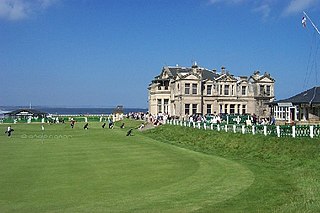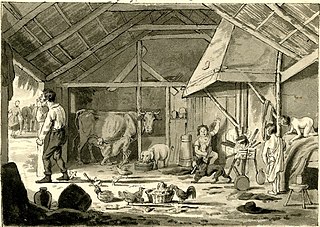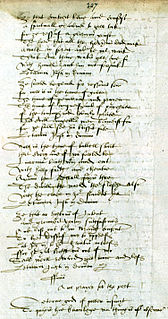
Scots is a West Germanic language variety spoken in Scotland and parts of Ulster in the north of Ireland. It is sometimes called Lowland Scots to distinguish it from Scottish Gaelic, the Goidelic Celtic language that was historically restricted to most of the Highlands, the Hebrides and Galloway after the 16th century. Modern Scots is a sister language of Modern English; the two diverged in the Early Middle English period (1150–1300).

William Dunbar was a Scottish makar poet active in the late fifteenth century and the early sixteenth century. He was closely associated with the court of King James IV and produced a large body of work in Scots distinguished by its great variation in themes and literary styles. He was likely a native of East Lothian, as assumed from a satirical reference in The Flyting of Dumbar and Kennedie. His surname is also spelt Dumbar.
The following is a partial timeline of the history of golf:

"Auld Lang Syne" is a Scots-language poem written by Robert Burns in 1788 and set to the tune of a traditional folk song. It is well known in many countries, especially in the English-speaking world, its traditional use being to bid farewell to the old year at the stroke of midnight on New Year's Eve. By extension, it is also sung at funerals, graduations, and as a farewell or ending to other occasions. The international Scouting movement in many countries uses it to close jamborees and other functions.

Kolven is a game originating from the Netherlands. It is played by four people; where players hit the ball over a certain distance and the first people to reach their opponents' starting point win. The games can last multiple days.

Medieval football is a modern term used for a wide variety of the localised informal football games which were invented and played in Europe during the Middle Ages. Alternative names include folk football, mob football and Shrovetide football. These games may be regarded as the ancestors of modern codes of football, and by comparison with later forms of football, the medieval matches were chaotic and had few rules.

The origins of golf are unclear and much debated. However, it is generally accepted that modern golf developed in Scotland from the Middle Ages onwards. The game did not find international popularity until the late 19th century, when it spread into the rest of the United Kingdom and then to the British Empire and the United States.

Sport plays a central role in Scottish culture. The temperate, oceanic climate has played a key part in the evolution of sport in Scotland, with all-weather sports like association football and golf dominating the national sporting consciousness. However, many other sports are played in the country, with popularity varying between sports and between regions.

This article details the history of football in Scotland.
The Eneados is a translation into Middle Scots of Virgil's Latin Aeneid, completed by the poet and clergyman Gavin Douglas in 1513.

Seton Palace was situated in East Lothian, a few miles south-east of Edinburgh near the town of Prestonpans. Often regarded as the most desirable Scottish residence of the sixteenth and seventeenth centuries, the palace was erected in the 15th century by George, 4th Lord Seton.

Golf in Scotland was first recorded in the Scottish late Middle Ages, and the modern game of golf was first developed and established in the country. The game plays a key role in the national sporting consciousness.
The Actes and Deidis of the Illustre and Vallyeant Campioun Schir William Wallace, also known as The Wallace, is a long "romantic biographical" poem by the fifteenth-century Scottish makar of the name Blind Harry probably at some time in the decade before 1488. As the title suggests, it commemorates and eulogises the life and actions of the Scottish freedom fighter William Wallace who lived a century and a half earlier. The poem is historically inaccurate, and mentions several events that never happened. For several hundred years following its publication, The Wallace was the second most popular book in Scotland after the Bible.
William Stewart was a Scottish poet working in the first half of the 16th century.

Meditatioun In Wyntir is a contemplative poem in Scots by William Dunbar.

The Wife of Auchtermuchty is a Scots poem of the fifteenth or sixteenth centuries.

Poetry of Scotland includes all forms of verse written in Brythonic, Latin, Scottish Gaelic, Scots, French, English and Esperanto and any language in which poetry has been written within the boundaries of modern Scotland, or by Scottish people.

Childhood in Medieval Scotland includes all aspects of childhood within the geographical area that became the Kingdom of Scotland, from the end of Roman power in Great Britain, until the Renaissance and Reformation in the sixteenth century.

"Christis Kirk on the Green" is an anonymous Middle Scots poem in 22 stanzas, now believed to have been written around the year 1500, giving a comic account of a brawl at a country fair. It was for many years mistakenly attributed either to James I of Scotland or to James V of Scotland. It gave rise to a whole tradition of humorous poems on similar subjects by Scottish poets down the centuries, including Allan Ramsay and Robert Burns, and is still one of the most frequently published works in Middle Scots. "Christis Kirk on the Green" has been called one of the finest performances in 15th-century British poetry.

Mary Maitland was a Scottish writer believed to be the transcriber of the Quarto Volume of the Maitland Manuscripts, an important source for the Scots literature of the Fifteenth and Sixteenth Centuries. She recorded and preserved her father's extensive writings as his sight became increasingly poor, eventually resulting in his blindness.
















